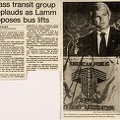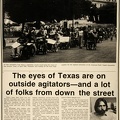![[Headline] Disabled Advocates Are Rolling on Washington D.C.
For the second year in a row wheelchair pickets will surround the national convention of the American Public Transit Association (APTA).
Some 150 to 200 wheelchair demonstrators are expected to join the picket lines, although that number could increase dramatically by the time the four day long convention opens Sept. 30 in Washington, D.C., according to a spokesperson for the American Disabled for Accessible Public Transportation (ADAPT).
But, unlike the convention held in Denver last year, ADAPT will not be allowed to argue the case for accessibility on the convention floor. “Gilstrap (APTA executive vice president Jack Gilstrap) told us there was no way we were going to speak this year,” Wade Blank said.
Nor does Blank expect APTA to vote on a resolution introduced at the 1983 convention calling upon APTA members to purchase only lift-equipped buses.
When the Carter administration mandated accessibility in the late 1970s, it was APTA that successfully fought those regulations in court, arguing that it was a judgment best left to the discretion of the local transit provider.
Some cities, like Seattle and San Jose, California, and-to a lesser extent-Denver, chose to make their systems accessible, but the vast majority refused, claiming the lifts were impractical and too expensive.
However, accessibility advocates say that the technology is available to design both economical and reliable lifts, but that bus manufacturers will not use it as long as there is little demand for lifts from transit providers.
APTA argues that in many, if not most cases paratransit systems can offer better and more economical services to disabled riders. ADAPT maintains that isn't so, arguing that cities such as Seattle are experiencing a steady drop in the per ride cost for lift-assisted trips while paratransit costs are constant, regardless of the number of trips.
At the Denver convention, APTA's position was championed by Colorado Governor Richard Lamm, who told the delegates that the country couldn't afford to equip all its buses with lifts and continue as a great nation. New York City Mayor Ed Koch is expected to take a similar tack at this year's convention.
In 1983, Denver Mayor Federico Pena, who was instrumental in getting ADAPT a place on the convention agenda, supported accessibility, just as this year's host mayor, Marion Berry, is expected to do.
Access/Denver will send 43 wheelchair demonstrators to Washington, although at press time they were short $4,400 of the $15,000 needed to provide them with transportation, food and lodging. Among the individuals contributing to the fund drive was Wellington Webb, an unsuccessful 1983 candidate for mayor of Denver.
In addition, Denver's HAIL, Inc., will be sending five representatives.
Several other cities, including Dallas, El Paso, Los Angeles, Cincinnati, Little Rock, Arkansas, Poughkeepsie, New York, and Chicago have confirmed that they will have representatives on the picket line. Boston's Disabled Liberation Front announced that it was sending eight pickets.
ADAPT intends to provide a training session in confrontational politics in Washington on September 26.
Ironically, one problem that demonstrators flying into Washington's Dulles International Airport will face is a lack of accessible buses between the airport and downtown Washington.
We were going to file a complaint, Blank said, but it turns out that the Department of Transportation runs the bus system there and they say that they are the administrators, not the recipients, of federal funds, and therefor are not required to provide accessible service. ADAPT (165).JPG](_data/i/upload/2015/11/25/20151125172839-e4b2f1f0-me.jpg)
[Headline] Disabled Advocates Are Rolling on Washington D.C.
For the second year in a row wheelchair pickets will surround the national convention of the American Public Transit Association (APTA).
Some 150 to 200 wheelchair demonstrators are expected to join the picket lines, although that number could increase dramatically by the time the four day long convention opens Sept. 30 in Washington, D.C., according to a spokesperson for the American Disabled for Accessible Public Transportation (ADAPT).
But, unlike the convention held in Denver last year, ADAPT will not be allowed to argue the case for accessibility on the convention floor. “Gilstrap (APTA executive vice president Jack Gilstrap) told us there was no way we were going to speak this year,” Wade Blank said.
Nor does Blank expect APTA to vote on a resolution introduced at the 1983 convention calling upon APTA members to purchase only lift-equipped buses.
When the Carter administration mandated accessibility in the late 1970s, it was APTA that successfully fought those regulations in court, arguing that it was a judgment best left to the discretion of the local transit provider.
Some cities, like Seattle and San Jose, California, and-to a lesser extent-Denver, chose to make their systems accessible, but the vast majority refused, claiming the lifts were impractical and too expensive.
However, accessibility advocates say that the technology is available to design both economical and reliable lifts, but that bus manufacturers will not use it as long as there is little demand for lifts from transit providers.
APTA argues that in many, if not most cases paratransit systems can offer better and more economical services to disabled riders. ADAPT maintains that isn't so, arguing that cities such as Seattle are experiencing a steady drop in the per ride cost for lift-assisted trips while paratransit costs are constant, regardless of the number of trips.
At the Denver convention, APTA's position was championed by Colorado Governor Richard Lamm, who told the delegates that the country couldn't afford to equip all its buses with lifts and continue as a great nation. New York City Mayor Ed Koch is expected to take a similar tack at this year's convention.
In 1983, Denver Mayor Federico Pena, who was instrumental in getting ADAPT a place on the convention agenda, supported accessibility, just as this year's host mayor, Marion Berry, is expected to do.
Access/Denver will send 43 wheelchair demonstrators to Washington, although at press time they were short $4,400 of the $15,000 needed to provide them with transportation, food and lodging. Among the individuals contributing to the fund drive was Wellington Webb, an unsuccessful 1983 candidate for mayor of Denver.
In addition, Denver's HAIL, Inc., will be sending five representatives.
Several other cities, including Dallas, El Paso, Los Angeles, Cincinnati, Little Rock, Arkansas, Poughkeepsie, New York, and Chicago have confirmed that they will have representatives on the picket line. Boston's Disabled Liberation Front announced that it was sending eight pickets.
ADAPT intends to provide a training session in confrontational politics in Washington on September 26.
Ironically, one problem that demonstrators flying into Washington's Dulles International Airport will face is a lack of accessible buses between the airport and downtown Washington.
"We were going to file a complaint," Blank said, "but it turns out that the Department of Transportation runs the bus system there and they say that they are the administrators, not the recipients, of federal funds, and therefor are not required to provide accessible service."
- Creat pe
- Joi 11 Iulie 2013
- Postat pe
- Miercuri 25 Noiembrie 2015
- Etichete
- ADAPT - American Disabled for Accessible Public Transportation, APTA - American Public Transit Association, Boston - Disabled People's Liberation Front, Chicago, Cincinnati, Dallas, demonstrators, Denver, DOT - Dept of Transportation, El Paso, Governor Richard Lamm, HAIL - Holistic Approaches to Independent Living, Jack Gilstrap, Little Rock, Los Angeles, Mayor Federico Pena, Mayor Koch, Mayor Marion Barry, paratransit, Poughkeepsie, President Jimmy Carter, resolution, San Jose, Seattle, vote, Wade Blank, Wellington Webb
- Vizite
- 5906
- Scor mediu
- nici o evaluare
- Evaluează aceasta imagine
- Make
- Canon
- Model
- Canon EOS 40D
- DateTimeOriginal
- 2013:07:11 11:04:06
- ApertureFNumber
- f/11.0


0 comentarii